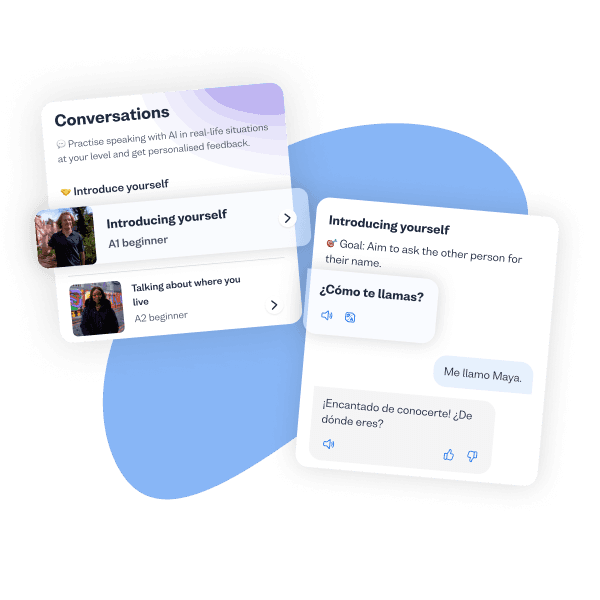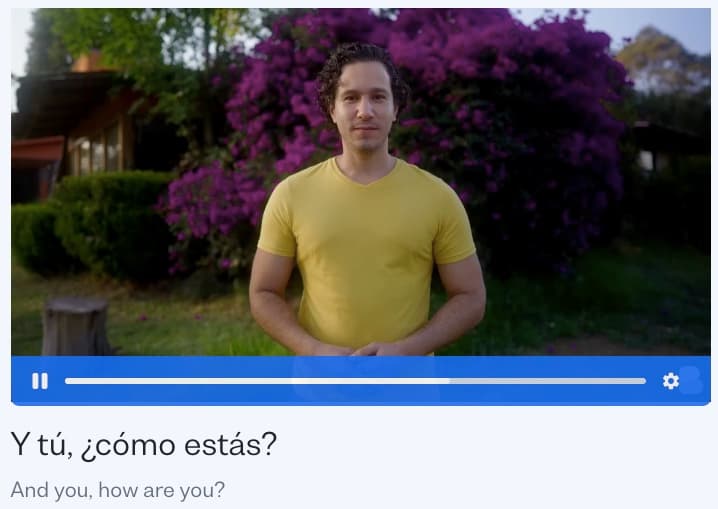I want to learn...
Spanish question words or interrogative words are quite common and useful. Regardless of your level of Spanish, you’ll use them frequently to ask about people, places, things and events. Have a look at our article 48 common Spanish phrases to survive any situation to get into the subject.
What’s more valuable than getting our needs met? Question words in Spanish are also used to start conversations and keep them going. Knowing the question words makes it easier to talk to strangers while traveling or have fun chatting with friends and coworkers in Spanish.
7 Spanish question words
This table shows the main question words in Spanish with their English translations.
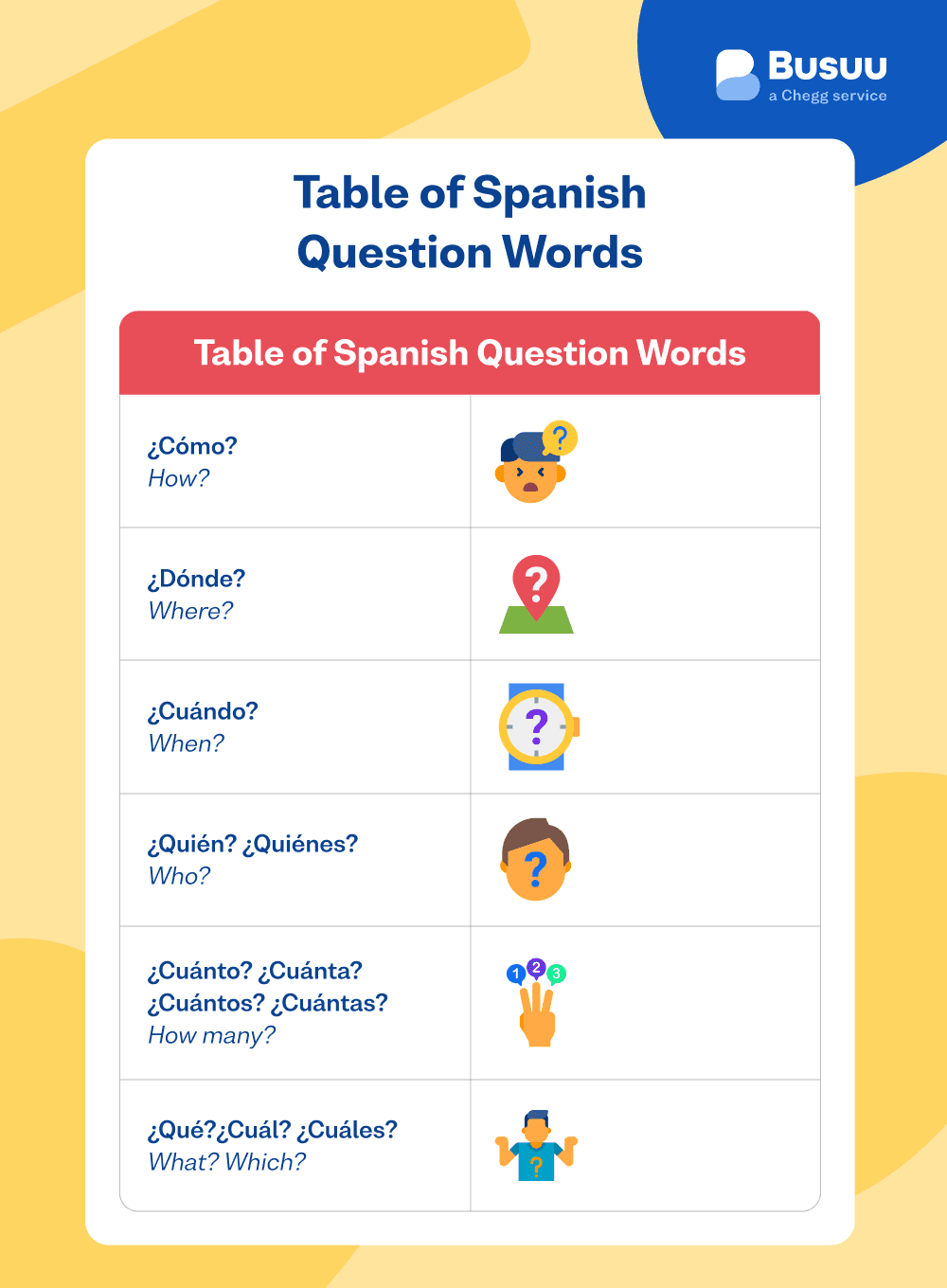
Table of Spanish Question Words
| Spanish | English |
|---|---|
| ¿Cómo? | How? |
| ¿Dónde? | Where? |
| ¿Cuándo? | When? |
| ¿Quién? ¿Quiénes? | Who? |
| ¿Cuánto? ¿Cuánta? ¿Cuántos? ¿Cuántas? | How many? |
| ¿Qué? | What? Which? |
| ¿Cuál? ¿Cuáles? | What? Which? |
Question words go with two essential punctuation marks
Before we get to know each question word better, let’s review two punctuation marks in Spanish.
Accent marks
Did you notice that all of the question words have an accent mark? Without the accent mark, the meaning of each question word changes.
Where does the accent mark go? Accent marks in Spanish always go on a vowel and are placed on the stressed syllable.
Here’s a trick to remember which vowel takes the accent mark in Spanish question words. Notice how each question word starts with a consonant, followed by 1-3 vowels. For this group of words, the accent mark goes on the last of the 1-3 vowels after the first consonant.
Take a look at the pattern below.
Table guide for vowels that takes the accent mark in Spanish question words
| There’s only one vowel after the first consonant so it gets the accent mark | The last vowel of the two vowels after the first consonant gets the accent mark | The last vowel of the three vowels after the first consonant gets the accent mark |
|---|---|---|
| ¿Cómo? ¿Dónde? | ¿Cuándo? ¿Cuánto/a/os/as? ¿Cuál/es? ¿Qué? | ¿Quién/es? |
To learn even more about accent marks, dive into this Busuu article: Spanish accents: seriously useful tricks to use, type and master them.
The inverted question mark
Like in English, texting and social media in Spanish can be pretty informal. Spanish speakers will often change the spelling of words or leave out accent marks and inverted question marks.
You’ll also notice that questions in Spanish use two question marks: an inverted question mark at the beginning of the question (not necessarily of the sentence) and one at the end of the sentence like in English. Example: ¿Dónde están mis llaves? (Where are my keys?)
Example:
On social media: Si porq yo tmbn voy
Formal: Sí, porque yo también voy.
We recommend using accent marks throughout your journey. So much of language learning happens through repetition. You can still write informally and include accent marks. Your learning will go faster and bonus, readers will be clear on what you mean.
Getting to know the 7 Spanish question words
1. ¿Cómo?
Usecómoto ask someone their name or how to do something.
Situation: Ask the person sitting next to you on tour what their name is.
Example: ¿Cómo te llamas? (What’s your name?)Situation: Ask an employee at a store how something works.
Example: ¿Cómo funciona? (How does it work?)
2. ¿Dónde?
Usedóndeto ask about where things are.
Situation: Ask a stranger how to get to the bus station.
Example: ¿Dónde está la terminal de autobuses? (Where’s the bus station?)Situation: Ask a friend where he lives.
Example: ¿Dónde vives? (Where do you live?)
3.¿Cuándo?
Use cuándoto ask when something will happen.
Situation: Ask your coworker when they will leave for vacation.
Example: ¿Cuándo te vas de vacaciones? (When do you leave for vacation?)Situation: Ask a friend when the play is.
Example: ¿Cuándo es la obra? (When is the play?)
4. ¿Cuánto / cuánta / cuántos / cuántas?
Use cuánto, cuánta, cuántos, cuántasto ask the amount of something.
Cuánto = uncountable masculine
Cuánta = uncountable feminine
Cuántos = countable masculine
Cuántas = countable feminine
Cuánto, cuánta, cuántos, cuántas follow gender and number agreement. That means the question word adapts to whether the noun is uncountable (singular) or countable (plural) and masculine or feminine.
Example:
¿Cuántos libros tiene tu familia? (How many books does your family have?)
Libros (books) is a masculine and countable noun so the wordcuánto/a/os/asadapts to it and becomes masculine and plural:cuántos.
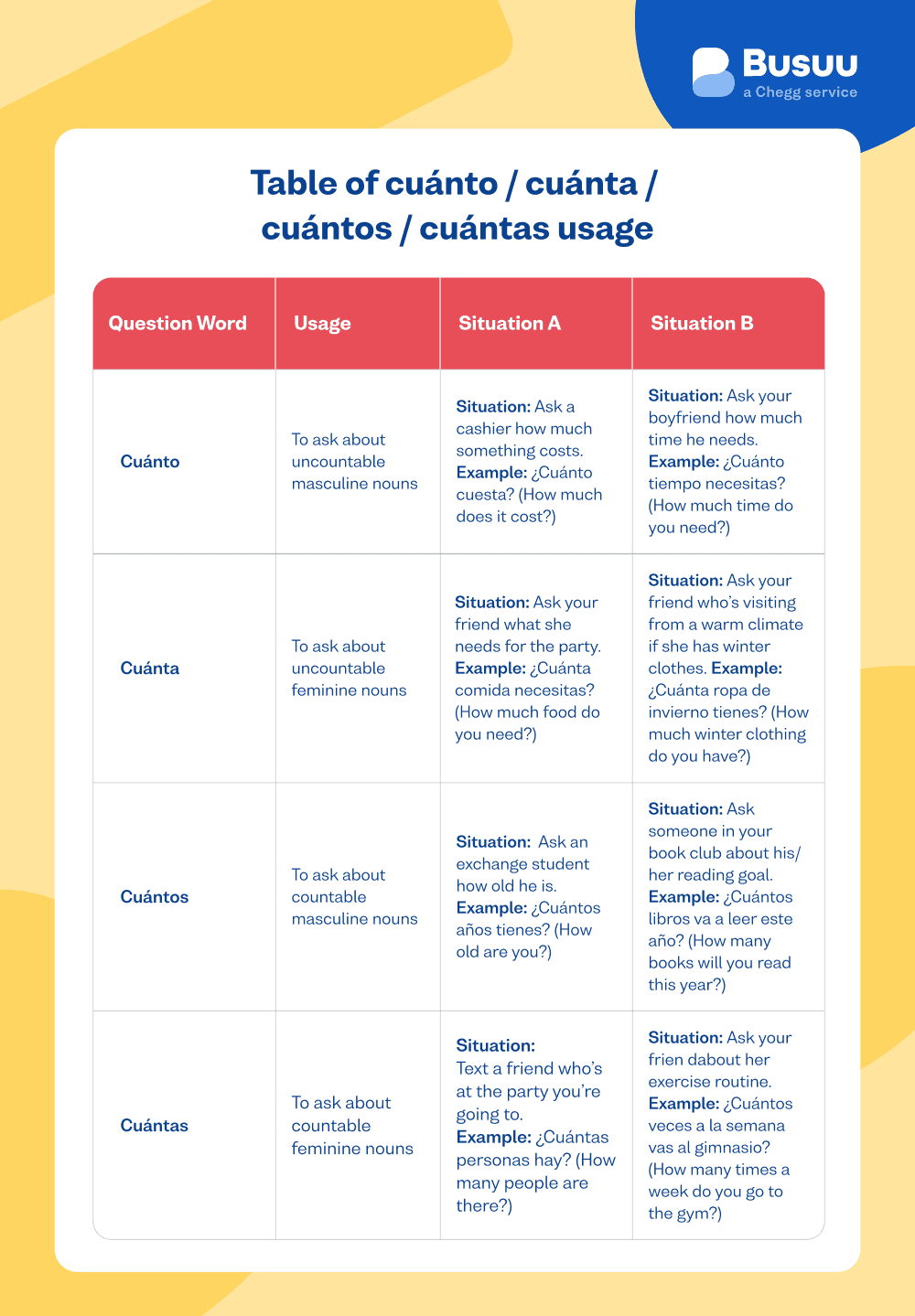
Table of cuánto / cuánta / cuántos / cuántas usage
| Question Word | Usage | Situation A | Situation B |
|---|---|---|---|
| Cuánto | To ask about uncountable masculine nouns | Situation: Ask a cashier how much something costs. Example: ¿Cuánto cuesta? (How much does it cost?) | Situation: Ask your boyfriend how much time he needs. Example: ¿Cuánto tiempo necesitas? (How much time do you need?) |
| Cuánta | To ask about uncountable feminine nouns | Situation: Ask your friend what she needs for the party. Example: ¿Cuánta comida necesitas? (How much food do you need?) | Situation: Ask your friend who’s visiting from a warm climate if she has winter clothes. Example: ¿Cuánta ropa de invierno tienes? (How much winter clothing do you have?) |
| Cuántos | To ask about countable masculine nouns | Situation: Ask an exchange student how old he is. Example: ¿Cuántos años tienes? (How old are you?) | Situation: Ask someone in your book club about his/her reading goal. Example: ¿Cuántos libros va a leer este año? (How many books will you read this year?) |
| Cuántas | To ask about countable feminine nouns | Situation: Text a friend who’s at the party you’re going to. Example: ¿Cuántas personas hay? (How many people are there?) | Situation: Ask your friend about her exercise routine. Example: ¿Cuántas veces a la semana vas al gimnasio? (How many times a week do you go to the gym?) |
5. ¿Quién/quiénes?
Use quién, quiénes to ask about people.
Quién = singular
Quiénes = plural
Words like quién, quiénes and cuál, cuáles follow number agreement. That means the question word adapts to whether the noun is singular or plural.
Example:
¿Quién es tu profesor? (Who’s your teacher?)
The noun, profesor (teacher) is singular so we use quién.
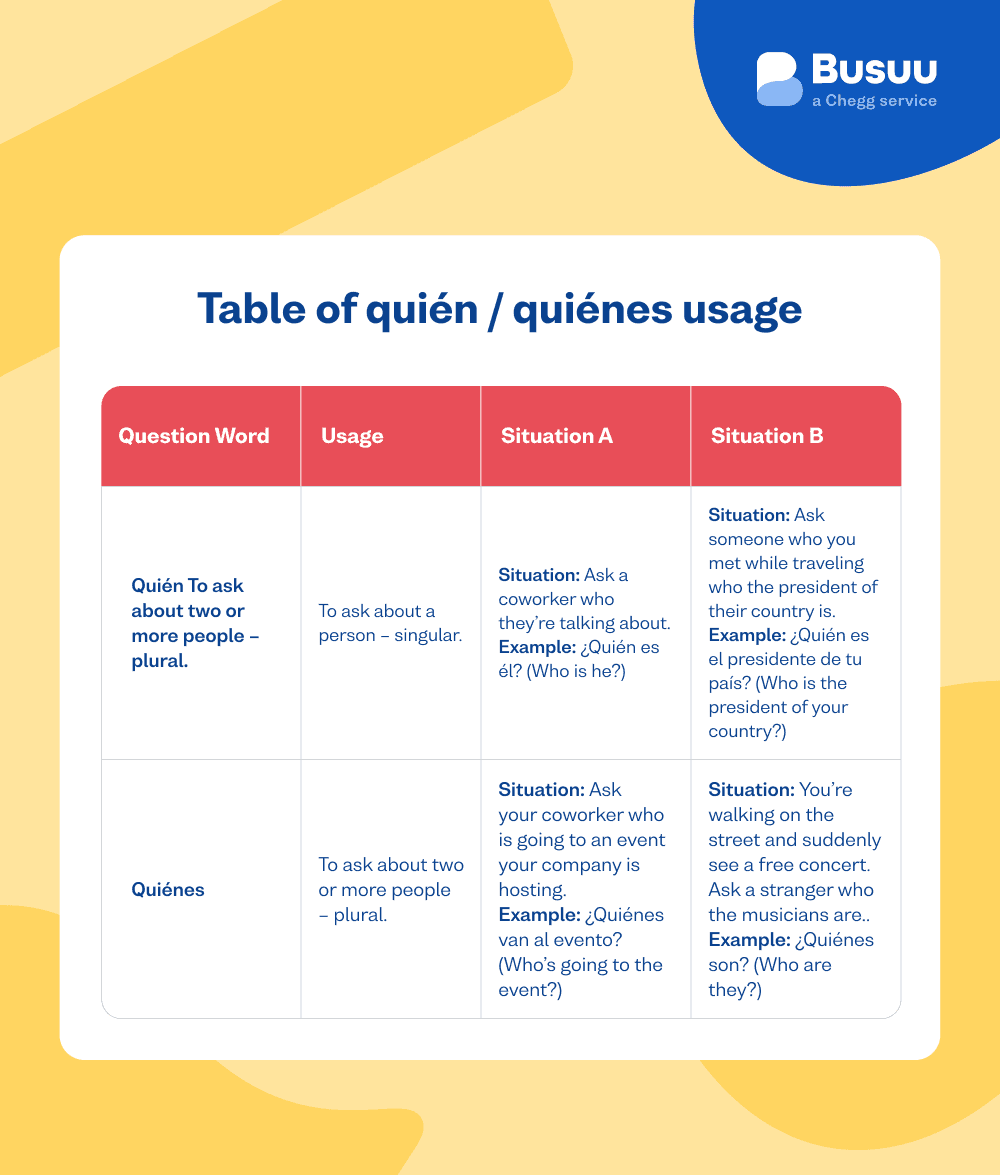
Table of quién / quiénes usage
| Question Word | Usage | Situation A | Situation B |
|---|---|---|---|
| Quién To ask about two or more people – plural. | To ask about a person – singular. | Situation: Ask a coworker who they’re talking about. Example: ¿Quién es él? (Who is he?) | Situation: Ask someone who you met while traveling who the president of their country is. Example: ¿Quién es el presidente de tu país? (Who is the president of your country?) |
| Quiénes | To ask about two or more people – plural. | Situation: Ask your coworker who is going to an event your company is hosting. Example: ¿Quiénes van al evento? (Who’s going to the event?) | Situation: You’re walking on the street and suddenly see a free concert. Ask a stranger who the musicians are.. Example: ¿Quiénes son? (Who are they?) |
6. ¿Cuál/cuáles?
Use cuál, cuáles to ask to choose between a group of things.
Cuál = singular
Cuáles = plural
Table of cuál / cuáles usage
| Question Word | Usage | Situation A | Situation B |
|---|---|---|---|
| Cuál | To identify somebody or something – singular. | Situation: Keep a conversation going with a new coworker at lunch. Example: ¿Cuál es tu equipo favorito? (Which is your favorite team?) | Situation: Ask someone you just asked out on a date what his/her favorite food is. Example: ¿Cuál es tu comida preferida? (What’s your favorite food?) |
| Cuáles | To identify somebody or something – plural. | Situation: Ask your friend at the art gallery show where her work is. Example: ¿Cuáles son los tuyos? (Which ones are yours?) | Situation: Talk to the person sitting next to you at a dinner party. Example: ¿Cuáles son tus pasatiempos? (What are your hobbies?) |
7. ¿Qué?
Use qué to ask about time or things in general.
Situation: Confirm the time when your phone has died.
Example: ¿Qué hora es? (What time is it?)Situation: Ask a store employee about a product.
Example: ¿Qué es esto? (What is this?)
It’s easy to confuse qué and cuál. They can both mean what or which. Luckily enough, if you switch them up people will still understand you.
At the beginning, consider context when choosing between them:
Use qué for general responses or when there isn’t a clear set of choices.
Use cuál for specificity, preferences or clarification.
Placing question words in Spanish
Where do you place the Spanish question words in questions? They will be the first or the second word (after a preposition like a, de, con, etc.) after the inverted question mark. Example: ¿Cómo vas a ir? (How are you going?) or ¿A dónde vas? (Where are you going?)
Conclusion
We’ve learned 7 question words or interrogative words in Spanish. With these words you can get your needs met and start conversations in Spanish.
Enjoy speaking to your classmates, coworkers, and Spanish speakers you might meet at events or while traveling. Start with the Spanish question words and watch your Spanish conversational skills progress.
Don’t stop now! Learn more and start using these Spanish question words!
Now that you know some question words in Spanish and how to use them, are you ready to practice them? Busuu offers free online courses, and reviews for you to practice these Spanish questions words in your daily conversations with fellow Spanish speakers!.
Newlanguages

